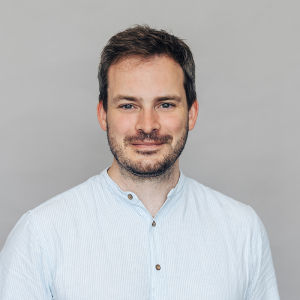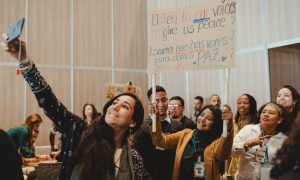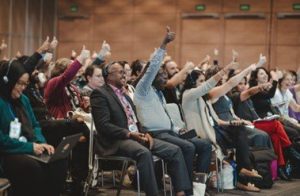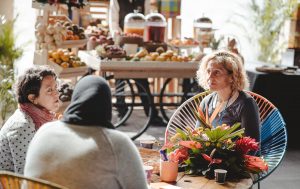Bogotá gave us confidence in our new ways of working
18 Dec 2024

Patrick Steiner-Hirth, Robert Bosch Stiftung
Patrick Steiner-Hirth is a Senior Project Manager at the Robert Bosch Stiftung, working in the Peace team, which is one of the foundation’s areas of focus in the Global Issues support strand. The foundation was a core funder of the Bogotá #ShiftThePower Global Summit in December 2023. Patrick studied International Relations in Germany, the U.S. and the U.K. Before joining the foundation in 2019, he worked as a political advisor in the German parliament.
A new approach for a changing world
In 2018, the Robert Bosch Stiftung began a major strategic review. Over its 60 years, the foundation’s international work had grown organically in diverse directions. This led to a decision that a new approach was needed that reflected the changes in the world, and which best enabled the foundation to promote positive and systemic change.
Over a period of some two years, programmes and initiatives began to be closed down and a new department of support launched under the banner of Global Issues with six areas of focus: Climate Change, Democracy, Immigration Society, Inequality, Migration, and Peace. In early 2020, just as the new programme launched, the COVID-19 pandemic struck – a challenge that also offered the chance to do things differently.
“We were just starting work on our new strategy – and we were still in the process of exiting from our old programmes. One of these was a major fellowship programme, and I discovered that I was able to get emergency funding quickly to individuals who were stranded in different places in the world.”
“And this realization – that we could do things differently and faster – created momentum for change. We were creating new strategies, so it felt like the right moment to be much clearer about what our financial and funding mechanisms actually are, and how we can minimize the reporting burdens that we put on our partners. We asked ourselves: what’s the basic minimum of reporting that we can ask for, depending on how the partner is structured, and in what circumstances? And we were able to weave new ways of working into our emerging strategies.”
“And this realization – that we could do things differently and faster – created momentum for change.”
The changes have rippled through and the foundation now funds in a very different way. “In the post COVID-19 world, rather than work in a very project-focused way, we are now offering more flexible funding, more long-term funding, more institutional or core funding.” Patrick estimates that across the Peace team anywhere between 50% – 70% of the foundation’s funding is now institutional rather than project funding.
“We no longer fund in the same fixed period, project-based way, usually. Now most of our funding is more open ended, with a commitment on our side over several years, with flexibility built in so that if an organization says a particular programme doesn’t need so much money, but they actually need money for staff salaries or whatever, scope to do that is baked into the contracts. We do not necessarily expect certain goals to be met within a year, but are instead funding the emergent strategies behind each programme. And this approach accounts for more and more of the Foundation’s funding now.”
Learning relationships and flexible funding
“We also are trying not to do open calls for funding anymore because we realized that this approach only gives access to a certain groups and we weren’t necessarily reaching those who already have a hard time working with Western or Global North donors.” When open calls are made “we always realize that the need is so big and we run into the problem of how do we decide who is going to get the money and who is not.”
“Now we usually try to start the partnership like an exchange. We have a memorandum of understanding for developing a ‘learning relationship’ and then maybe programmes and projects drop out of that. We still have the problem of access – there are some new actors being funded, but the number we can fund is still limited.”
“Now the way we work is more organic, we are not really pitched many projects and programmes anymore.”
“Now the way we work is more organic, we are not really pitched many projects and programmes anymore. Usually, with most of our partners, once we invite somebody to actually fill in a proposal everything has been discussed and agreed already. The partner can hand in the formal proposal and we have already narrowed it down to as little paperwork as possible. This approach is also liberating from our point of view, to be honest, because it never felt quite right that we have this ‘power of selection’ to decide who gets funded and who doesn’t out of a very big pool.”
The foundation’s new approach to partnerships doesn’t work for everyone. “We have had some feedback from partners saying: it’s great that you’re doing this, a learning relationship sounds cool theoretically, but the rest of the system is working to another logic and right now your approach feels like an extra burden. We would just like to send you the project proposal that we sent to other funders.” Being locked into the dysfunctional relationship between funders and their partners is “what some people call ‘feeding the beast’”, says Patrick. “Sometimes it’s hard for everybody involved to break the cycle.”
Peace builders and the “Road to Bogotá”
It was the foundation’s strategic overhaul that ultimately led Patrick and the Peace team to connect with the GFCF and the #ShiftThePower movement. “In the beginning of this new era, we had a big question mark around how we could make a real difference in the Peace sector when we have relatively limited funding of around 4 to 5 million Euros a year. We were looking for what we could do that others can’t or aren’t willing to do. So we quickly moved in the direction of supporting local peace builders.”
“That was how we met organizations like Conducive Space for Peace and Peace Direct.” It was Dylan Matthews of Peace Direct who introduced Patrick and colleagues to GFCF. “Dylan wanted to support local peace builders to go to the #ShiftThePower Summit in Bogotá.” Peace Direct were working on shifting the peace building field towards more local ownership and fairness – they wanted to see better relationships between funders and partners and more focus on the actual lived experience on the ground.
“Apparently, at previous Summits there had been only a few peace building organizations, and we heard that groups in that sector seemed to not feel that they were a part of this movement – so we decided to support groups to attend and also fund the “Road to Bogotá” work directly, despite the fact that it was not specifically aimed at peace building. We saw it as a step towards reforming the international system. Of course, the setting of Bogotá and Colombia would bring a certain peace building focus because of their history.”
The pleasure of discomfort
Being one of a small number of funders among many civil society organizations at the Summit in Bogotá was a powerful experience for Patrick and his colleague Lukas Drammeh. “It was Jesse Evans from Humanity United who called it – and I’ve quoted him a lot since then – the ‘pleasure of discomfort.’ That sums it up perfectly. Bogotá was simply one of the greatest learning experiences of my professional life. To be in that space, to be outnumbered, to be challenged, was really good and humbling as well. People were free to be blunt and speak their minds. It was very liberating to have conversations free of the baggage that normally goes with a potential funding relationship.”
“Bogotá was simply one of the greatest learning experiences of my professional life. To be in that space, to be outnumbered, to be challenged, was really good and humbling as well.”
“It also felt nice to find that the steps that the foundation had already taken to become a better funder were appreciated. There was recognition of what we are trying to do and we came back with more confidence to continue our internal discussions and to make the case that we are on the right path.”
“Our experience at the Summit fed into the discussions we are having in the foundation about our decolonizing efforts, for example: how are we are reforming our funding mechanisms? How are we developing partnerships? What is our place in the system? How do we deal with our privilege and the power imbalances in our relationships? So we brought a lot from Bogotá into these discussions, not just to the Peace team but across the whole foundation.”
“Afterwards, Lukas and I regretted that more people from the foundation’s Global Issues department didn’t attend. The foundation will certainly follow what the #ShiftThePower movement is doing and we still think of ourselves as part of this movement, but in the future our hope is the foundation would have a broader engagement and not limited to just one team.”
Shifting the power and the German context
In Germany, the #ShiftThePower conversation is slowly developing. “When we started discussing a programme to find ways that the German Foreign Ministry could have a greater impact with its development funding we realized that local ownership is often defined quite differently. It is not always clear whether we are just talking about locally-implemented programmes or truly locally-owned and locally-led initiatives.”
“However, there is momentum in Germany as well that includes ministries. It’s slow progress, but I do have the feeling that there are more people there who understand what impact greater local ownership could bring. It sometimes takes time to materialize, but we are seeing the right kind of lingo in documents and policies now. Maybe we need to get better at providing the evidence of positive impact of local ownership and giving civil society a meaningful voice if we want to challenge the established ways of working.”
“It is not always clear whether we are just talking about locally-implemented programmes or truly locally-owned and locally-led initiatives.”
“There seems to be a fear on the side of the donors, about whether there is really an impact from our efforts, and how does our impact on a few organizations – or a small region – contribute to a broader idea of positive peace.”
But for the Robert Bosch Stiftung, it seems the direction of travel is clear – to continue trying to do things differently. “Our new CEO encourages the understanding that philanthropic actors can take risks, do things and fund things that others cannot or do not dare to do. And if we operate under the same restrictions as bilateral donors, what’s the point?”
“Today, the Peace team is in such close contact with our partners on the ground – and we are now, almost by default, advocates within our organization to push for more freedoms, more flexibility, more trust in our partnerships. We are also trying to find a new balance with the accountability responsibilities that we have towards the German tax authorities. COVID-19 made us realize we could move much faster – and the feeling here is let’s keep doing it this way – it’s much easier, much fairer, and we have much better relationships now with our partners.”




